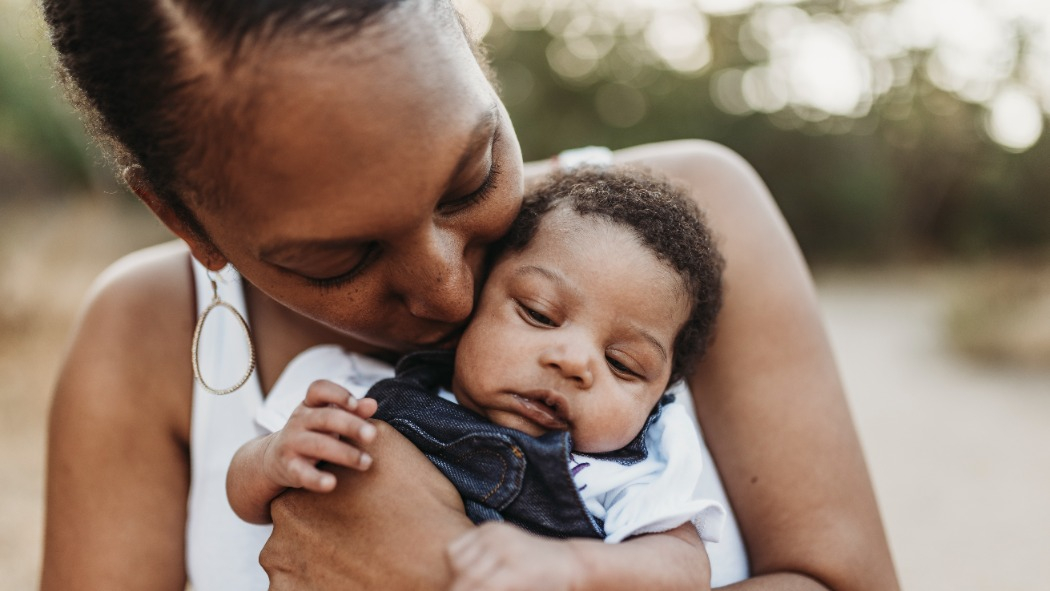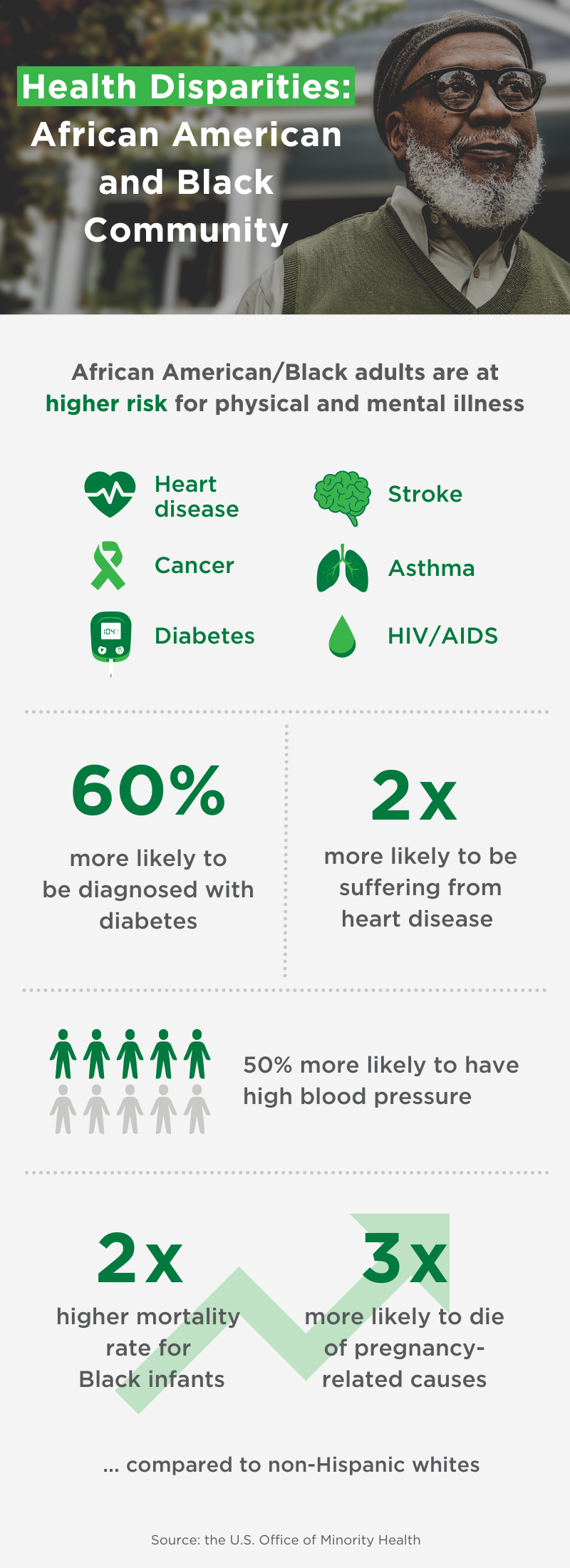
Members of the African American/Black community are all too familiar with the impact of health disparities in America.
Due to structural and systemic economic barriers, African American/Black individuals face a wide range of inequities that affect their Social Determinants of Health (SDOH). This includes inequity in pay and generational wealth, home ownership, and access to education, healthy food, and health insurance – which all play critical roles in achieving optimal health, wellness, and vitality. According to the National Academy of Medicine, SDOH affect more than 80% of health outcomes.
One example of how SDOH translate to disparities in patient outcomes and higher costs for the healthcare system is visits to the emergency department. An analysis conducted by the Evernorth Research Institute found that areas with very high social needs experienced 30% more emergency department visits than areas with low social needs.
This, combined with other implicit and explicit biases and a lack of cultural competencies in the healthcare system, has compounded the barriers and challenges faced by the African American/Black community. According to one study by Pew Research, 56% of Black Americans said they’ve had at least one negative experience in their healthcare journey, including having to speak up to get the proper care and feeling as if they are being treated with less respect than other patients.
The story doesn’t end there. Despite these challenges and inequities, it is crucial to note the importance and history of resilience of the African American/Black community. One study found that the physical, mental, and collective resilience among the African American/Black community may help chart new pathways to understanding health in the face of adversity. And when it comes to SDOH, a wide range of positive trends demonstrate this resilience. For example, a recent study found that African American/Black women are now among the most educated group in the United States. For years, they have been receiving degrees and enrolling in college at a higher rate than their white counterparts.
Organizations like The Cigna Group must help build upon these positive trends and this resilience and be responsible for reducing health inequities wherever they exist. For us, achieving optimal health and vitality for all means creating innovative experiences, improved access to care, tailored products, and stronger communities. By working together with employers, local health systems, policymakers, and communities, we are investing in solutions to address health literacy, inclusivity, and economic, environmental, and social support systems – all designed to make a meaningful impact on health equity.
Read on to learn more about the health disparities that African Americans/Black adults face, and the ways The Cigna Group is committed to advancing the health and well-being of the African American/Black community.
Health disparities facing the African American/Black community
 Let’s examine the specific health disparities faced by the African American/Black community in more detail. African Americans/Blacks are at higher risk for a wide range of physical and mental illnesses compared to their white counterparts. According to the U.S. Office of Minority Health, African Americans/Blacks are at higher risk for heart disease, stroke, cancer, asthma, influenza, pneumonia, diabetes, and HIV/AIDS.
Let’s examine the specific health disparities faced by the African American/Black community in more detail. African Americans/Blacks are at higher risk for a wide range of physical and mental illnesses compared to their white counterparts. According to the U.S. Office of Minority Health, African Americans/Blacks are at higher risk for heart disease, stroke, cancer, asthma, influenza, pneumonia, diabetes, and HIV/AIDS.
Consider the following statistics. African American/Black adults are 60% more likely than non-Hispanic white adults to be diagnosed with diabetes by a physician. Black women are three times more likely to die of pregnancy-related causes than white women. Heart disease is also a risk for the African American/Black community, with twice as many African American/Black Americans aged 18-49 suffering from heart disease than white Americans in that age group. Additionally, African American/Black adults aged 35-64 are 50% more likely to have high blood pressure than white Americans.
Members of the African American/Black community also have a higher rate of colorectal cancer, are more likely to be diagnosed at a later stage, and have lower survival rates than their white counterparts. And, when it comes to mental health, access and stigma are major issues.
The COVID-19 pandemic only magnified these disparities. Data from Johns Hopkins found that compared with white Americans, African Americans/Blacks are disproportionately affected by COVID-19, experiencing cases at a rate 2.6 times higher, hospitalizations at a rate 4.7 times higher, and a death rate from coronavirus 2.1 times higher – which researchers attribute to inconsistent access to healthcare and other SDOH factors.
Building cultural competency and addressing SDOH
The Cigna Group is committed to addressing SDOH and proactively engaging with communities that may be at the highest risk while respecting and understanding their unique needs.
Evernorth, The Cigna Group's health services division, created the Evernorth Geographic Social Determinants Index (EGSDI), which incorporates census data with 22 social determinant measures across six categories: economic, education, food access, health coverage, infrastructure, and language. This helps health plan sponsors quantify the potential impact of SDOH in a particular area, highlighting opportunities to proactively support communities that have a greater likelihood of being underserved.
For example, Evernorth helps use this data to encourage health plan sponsors to proactively reach out to underserved communities to offer additional diabetes support resources, such as patient monitoring and medication reminder programs, referrals to community education initiatives and copay assistance programs, and access to coaches and care professionals who understand the impacts of social determinants. The Cigna Group also leverages this data to ensure access to quality care through virtual care or digital tools, such as MDLIVE, to improve affordability through payment assistance, preventive care, and prescription drug savings programs, and to promote health literacy and affordability with interpretation and written translation services where needed.
Building cultural competency in healthcare is another key way we are working to improve health outcomes for the African American/Black community. Cultural competency in healthcare is the ability to recognize and understand cultural distinctions, address biases, and adapt care delivery and services to meet unique social, cultural, and language needs. We are working to improve cultural competency by increasing awareness, outreach, and training for clinicians in areas of inequity.
When it comes to diabetes care, a culturally appropriate treatment plan can help make long-term management of the disease easier for African American/Black patients, which can improve treatment adherence and lead to better health outcomes. African American/Black patients with diabetes are more likely to be trusting and receptive of treatment advice from a provider who understands and considers their culture and beliefs, lifestyle and circumstances, and the issues and challenges they face.
The Cigna Group offers a specialized training course designed to help raise awareness of these needs among staff clinicians through cultural insights and potential solutions to help them address social barriers and improve diabetes management. These trainings can help increase the confidence of providers and help them feel more comfortable discussing a patient’s culture, background, dietary customs, and beliefs as they relate to diabetes management. The Cigna Group also adapted the training course into an educational module and video series for network providers who want to enhance the cultural competency of their practice.
Investing in local communities
To further address SDOH at the root of negative health outcomes, The Cigna Group is committed to supporting local communities. The Cigna Group launched the Building Equity and Equality Program, a five-year initiative to expand and accelerate our efforts to support diversity, equity, and inclusion for historically underrepresented communities. Through the program, The Cigna Group invests in initiatives and partnerships to improve health outcomes, including access to education, job opportunities, and healthcare for the African American/Black community.
The Cigna Group also connects customers with community resources like FindHelp.org, which offers access to transportation and food assistance. Through the Cigna Foundation, we have donated over $50 million to charitable giving efforts and nonprofits that focus on eliminating health disparities.
For example, the Cigna Foundation created an endowed scholarship to increase the diversity in the medical doctor pipeline and awarded a grant to support the Health Advocates In-Reach and Research (HAIR) initiative with The University of Maryland School of Public Health to promote the importance of preventive care, including vaccinations and screenings for colorectal cancer.
Supporting maternal health in the African American/Black community
Many African American/Black women experience devastating disparities in maternal and child healthcare. For example, according to the U.S. Centers for Disease Control and Prevention, Black women are three times more likely to die of pregnancy-related causes than white women, and the African American/Black infant mortality rate is twice the rate for white infants. Disparities are also illustrated by the rates of preterm birth. In 2020, the rate of preterm births among African American/Black women was nearly 50% higher than the rate for white or Hispanic/Latina women.
To support healthy pregnancies, The Cigna Group launched a maternity health program in partnership with its pharmacy benefits management arm, Express Scripts, where all Cigna Healthcare customers receive free prenatal vitamins and aspirin to prevent preeclampsia, as determined by their doctor, behavioral screenings, oral health education/support, and transportation. Through this program, we work directly with expectant mothers to assess the risk for preterm birth and identify any SDOH-related challenges. For example, if mothers lack access to healthy foods, the program connects them with appropriate services.
“The U.S. has the highest maternal mortality rate among developed nations, and despite all that we spend on healthcare and all the advancements in medicine, our rates in maternal morbidity and mortality are actually going up,” said Dr. Neema Stephens, national medical director for health equity, in a previous interview with our Newsroom staff. “The Cigna Group is committed to addressing the significant racial disparities in maternal care by implementing targeted interventions to individuals at highest risk and providing an additional layer of support by screening for social needs.”
